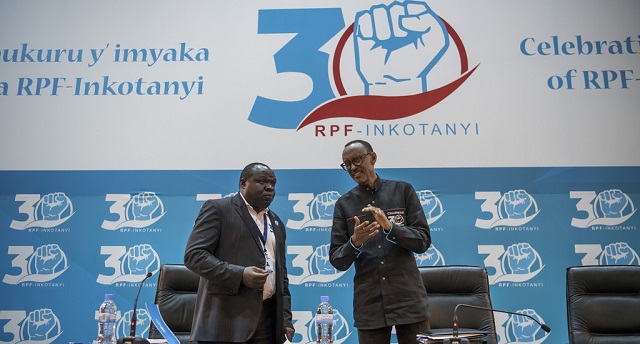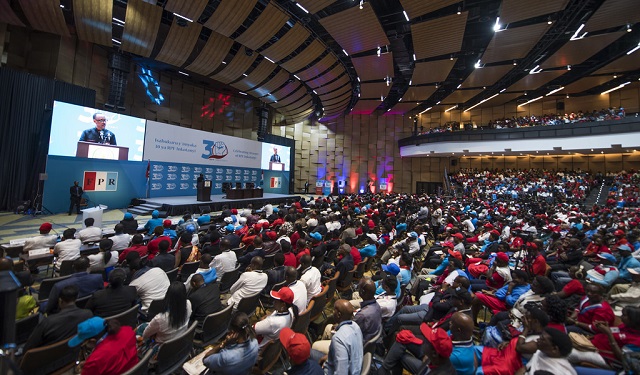
How the struggle to liberate Rwanda has shaped the character of post genocide reconstruction
THE LAST WORD | Andrew M. Mwenda | This year, the Rwanda Patriotic Front (RPF) celebrated its 30th birthday in a magnificent conference hall at its headquarters in Gasabo, 15km outside of Kigali. The party headquarter complex looks like a five star hotel resort; not a usual feat for political parties anywhere in the world. What defines this discipline that has made this party successful in politics, military, and business? RPF is very unique.
First, all of Africa’s rebel groups survive politically because they largely conduct their military operations from territories where the local population – largely for ethnic reasons – identify with them. Popular support is critical because civilians provide recruits, intelligence, food and morale to the rebels. In Ethiopia, Eritrea, Uganda, Liberia, Sierra Leone, Mozambique, Angola, Somalia, Ivory Coast, this factor held. Because of Rwanda’s ethnic configuration, the RPF fought in areas where it had little or no popular support.
Secondly, many African rebels survive because of the patronage of a foreign power like the Americans did in Mozambique and Angola during the Cold War. RPF was financed by poor Uganda with President Yoweri Museveni providing minimum support and insisting it develops internal organisational capabilities for self-sustenance.
Thirdly, regime collapse to rebels in Somalia, Sierra Leone, Liberia, and Ethiopia took place only after foreign support government had dried out. RPF’s military victory was secured when French military assistance to the government of President Juvenal Habyarimana was at its peak. The French supplied weapons, trained the Rwandan army, and in some cases directly provided command or instruction to government troops on the frontline.
Fourth, other rebel movements fight in areas, which have rich minerals like diamonds and gold. Rebels rush to take control of such resources to finance their military operations. This was the case with Angola, DR Congo, Sierra Leone and Liberia. The RPF fought in a resource scarce environment without rich minerals from which it could expect to generate revenues to finance the war.
Finally, the average length of civil wars since 1945 has been over ten years. The RPF secured a military victory in less than four years. Indeed the RPF could have captured power a year early but was literally stopped by Uganda under pressure from the French; thus forcing it to the negotiating table in Arusha. The RPF, therefore, exhibited unusually superior organisational capabilities.
When RPF invaded Rwanda in 1990, it suffered a humiliating defeat. On the second day of invasion, its legendary commander, Maj. Gen. Fred Rwigyema was killed. Within a month all the top commanders had been killed, the rebels repulsed, and the nation secured. This was a devastating blow to their morale. Many soldiers threw away their weapons and deserted. Military victory looked remote.
When Paul Kagame arrived from the U.S. to take command, he found an organisation where high morale had turned into deep disillusionment, confidence into self-doubt and hope into despair. Kagame once told me how, upon arrival in the combat zone, he was taken to the sick bay. It was full of hundreds of injured and groaning troops; the dead lay next to the dying. They had lost almost all their best weapons, had no money, no food, and no medicines.
How does one reorganize and inspire such a defeated and demoralised army? It requires extraordinary fortitude, discipline, managerial ability and strategic focus; someone who can inspire hope, mobilise resources, reestablish command and convince a dejected and desperate group to go back into battle. That man turned out to be Kagame. Short of him, it is inconceivable that the RPF would have regrouped and become a formidable fighting machine it turned out to be – and within one year.

Stanford’s Jeremy Weinstein has argued that rebel groups face adverse selection problems in their recruitment; the commander is not sure of the subjective motivations of his new recruit in joining rebellion. The new recruit could be an infiltrator from government; that is why rebel groups in Africa tend to be ethnically narrow – relying on the trust of the tribe rather than the pull of political ideology.
If the rebellion is conducted in a resource rich region, the recruit could also be a fortune seeker looking for quick economic payoff – to grab a diamond or gold mine. Such a recruit will certainly not be seriously committed to the political objectives of the rebel group. Weinstein refers to this category of low-commitment, fortune-seeking, opportunistic recruits as “consumers.”
Because the RPF fought an entrenched military regime in a resource scarce environment, there was no expectation of an easy and quick victory or a handsome financial payoff. So the opportunists either kept away or when they joined, they immediately deserted. As a result, the RPF tended to attract, as recruits, individuals who were highly committed to its ideology and who were willing to make high sacrifices in pursuit of its political objectives. Weinstein calls these high commitment individuals “investors.” RPF conducted its operations in the Virunga Mountains where the physical conditions were very harsh. It took extraordinary physical and mental strength to survive.
This way, the RPF was able to build an organisation of like-minded, high commitment cadres who were physically and mentally strong. This led to the evolution of a cohesive organisation with a strong esprit de corps and a strong commitment to collective goals. Thus, whereas in resource-rich environments the opportunists tend to crowd out high commitment individuals, in resource-scarce environments the reverse happens.
With limited foreign patronage and given the commitment of its cadres plus the effectiveness of its organisation, the RPF raised money from its own people. From the poor refugee in a camp in Uganda who sold his cows, to the expatriate working with an international organisation in Canada who surrendered a part of is salary every month, everyone contributed. The RPF is an important statement about poor people – that given the right incentives, they can mobilise their savings and invest in causes they consider important.
As a result, five definitive characteristics emerged to shape the character of RPF: first, a strong culture of self-reliance; second, a penchant for fiscal discipline; third, a deep-seated hostility to corruption and misuse of collective funds; fourth, suspicion and mistrust of the international community which had been indifferent to their cause and fifth and a high level of internal cohesion.
Today, these virtues of the RPF have shaped post genocide Rwanda. They have led to confidence in the capacity of Rwandans to pull themselves up by their own bootstraps. This is the basis of their confidence in their identity i.e. ndi’umunyarwanda and their dignity i.e. agaciro.
*****
amwenda@independent.co.ug
 The Independent Uganda: You get the Truth we Pay the Price
The Independent Uganda: You get the Truth we Pay the Price




“…….five definitive characteristics emerged to shape the character of RPF: first,
(i) a strong culture of self-reliance; second,
(ii) a penchant for fiscal discipline; third,
(iii) a deep-seated hostility to corruption and misuse of collective funds; fourth,
(iv) suspicion and mistrust of the international community which had been indifferent to their cause and fifth and (v) a high level of internal cohesion……….”
Thank you so much Mwenda for giving us this Xmas and New Year (otherwise classified) information on how they made it. Everyone has been wondering how a perilous situation(such as they were in) swings from ‘imminent defeat to victory'(such as they attained) that characterised the RPF struggle. I will try to memorise this seemingly unfailing formula and repeat it to modern-day-directionless youth. As for whether the RPF will stick to their victory-giving-characteristics will determine their long-life or perishing. Once more Mwenda, thank you for this informative and objective narration. This article proves you can be empirical when you want to. Please stay so Mwenda.
Andrew this article is too sweet you deserve a hot kiss from the ladies before the year ends.
1. Thank heavens that the new crop of Africans leaders like. Kagame,M7,the late Meles Zenawi have not disappointed Africa they will forever be remembered in the History of Africa for having laid the foundation and set the template for the economic,political and social development of Africa. (Actually their contribution to the development of Africa is greater than that of Mandela.
2.Rwanda and Ethiopia find it easy to implement their economic policies because they are free no one remote controls their political managers.
3. Rwanda,s economy is sustained by the taxes collected and revenue generated from tourism so they live within their means for they are fully aware that they are still making friends with the 1st world unlike in Ug and Kenya where their economies are sustained by international Aid and global activist who keep on rudely interrupting their decisions.
4. Rwanda was colonised by Belgium and German they actually abandoned Rwanda long ago even during the genocide they did not show up so why has Rwanda moved on its because she has realized that no one cares for her she can only do herself a favor by getting set and go But in Ug and Kenya ,their legs are tied on a tree in Britain perhaps thats why their opposition leaders are big headed for they know that Britain still cares for her former colonies.
5.Africa is naturally falling in line with the norms of civilization because of the global social,economic and political trends so ,fake and old fashioned rebel leaders like Charles Taylor ,Kony have no space for practicing their primitive ideas.
6.Dear Ugandan Men when we ladies go dancing please dont think that we take our butts to be squeezed by strangers some of us are lawyers from Britain we get pissed off with your rude acts..
Winnie raises a good point on the relationship between foreign intervention and development in the third world especially with regard to Ethiopia and Rwanda’s rate of development.